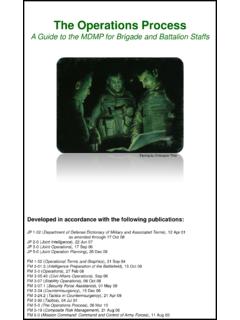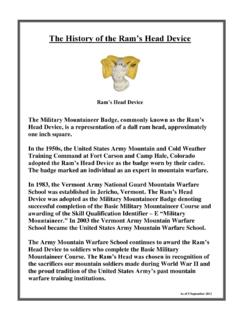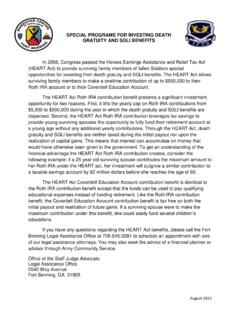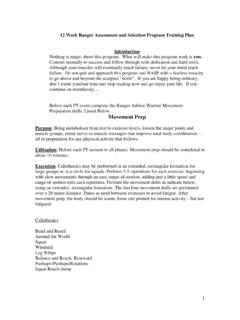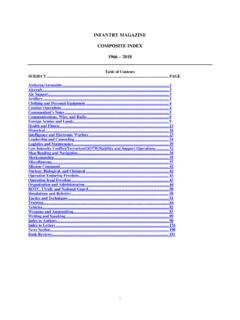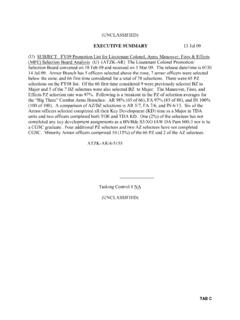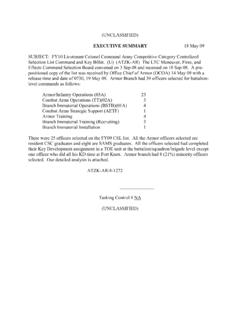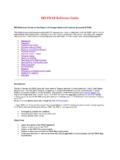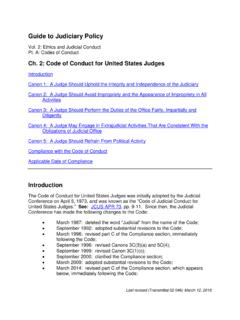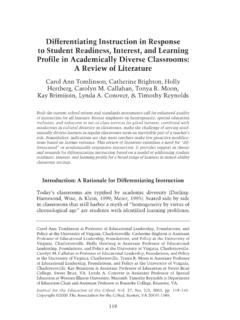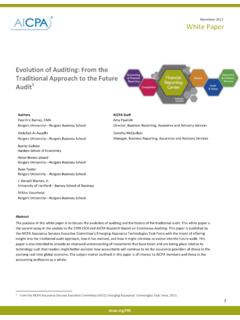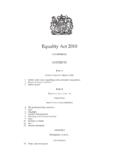Transcription of by Robert K. Greenleaf - United States Army
1 The Servant as Leader by Robert K. Greenleaf The Servant as Leader Page 2 The Servant as Leader SERVANT AND LEADER can these two roles be fused in one real person, in all levels of status or calling? If so, can that person live and be productive in the real world of the present? My sense of the present leads me to say yes to both questions. This paper is an attempt to explain why and to suggest how. The idea of The Servant as Leader came out of reading Hermann Hesse s Journey to the East. In this story we see a band of men on a mythical journey, probably also Hesse s own journey.
2 The central figure of the story is Leo who accompanies the party as the servant who does their menial chores, but who also sustains them with his spirit and his song. He is a person of extraordinary presence. All goes well until Leo disappears. Then the group falls into disarray and the journey is abandoned. They cannot make it without the servant Leo. The narrator, one of the party, after some years of wandering finds Leo and is taken into the Order that had sponsored the journey. There he discovers that Leo, whom he had known first as servant, was in fact the titular head of the Order, its guiding spirit, a great and noble leader.
3 One can muse on what Hesse was trying to say when he wrote this story. We know that most of his fiction was autobiographical, that he led a tortured life, and that Journey to the East suggests a turn toward the serenity he achieved in his old age. There has been much speculation by critics on Hesse s life and work, some of it centering on this story which they find the most puzzling. But to me, this story clearly says that the great leader is seen as servant first, and that simple fact is the key to his greatness.
4 Leo was actually the leader all of the time, but he was servant first because that was what he was, deep down inside. Leadership was bestowed upon a man who was by nature a servant. It was something given, or assumed, that could be taken away. His servant nature was the real man, not bestowed, not assumed, and not to be taken away. He was servant first. I mention Hesse and Journey to the East for two reasons. First, I want to acknowledge the source of the idea of The Servant as Leader.
5 Then I want to use this reference as an introduction to a brief discussion of prophecy. Fifteen years ago when I first read about Leo, if I had been listening to contemporary prophecy as intently as I do now, the first draft of this piece might have been written then. As it was, the idea lay dormant for eleven years until, four years ago, I concluded that we in this country were in a leadership crisis and that I should do what I could about it. I became painfully aware of how dull my sense of contemporary prophecy had been. And I have reflected much on why we do not hear and heed the prophetic voices in our midst (not a new question in our times, nor more critical than heretofore).
6 I now embrace the theory of prophecy which holds that prophetic voices of great clarity, and with a quality of insight equal to that of any age, are speaking cogently all of the time. Men and women of a stature equal to the greatest of the past are with us now addressing the problems of the day and pointing to a better way and to a personeity better able to live fully and serenely in these times. The Servant as Leader Page 3 The variable that marks some periods as barren and some as rich in prophetic vision is in the interest , the level of seeking, the responsiveness of the hearers.
7 The variable is not in the presence or absence or the relative quality and force of the prophetic voices. Prophets grow in stature as people respond to their message. If their early attempts are ignored or spurned, their talent may wither away. It is seekers, then, who make prophets, and the initiative of anyone of us in searching for and responding to the voice of contemporary prophets may mark the turning point in their growth and service. But since we are the product of our own history, we see current prophecy within the context of past wisdom.
8 We listen to as wide a range of contemporary thought as we can attend to. Then we choose those we elect to heed as prophets both old and new and meld their advice with our own leadings. This we test in real-Iife experiences to establish our own position. Some who have difficulty with this theory assert that their faith rests on one or more of the prophets of old having given the word for all time and that the contemporary ones do not speak to their condition as the older ones do. But if one really believes that the word has been given for all time, how can one be a seeker?
9 How can one hear the contemporary voice when one has decided not to live in the present and has turned that voice off? Neither this hypothesis nor its opposite can be proved. But I submit that the one given here is the more hopeful choice, one that offers a significant role in prophecy to every individual. One cannot interact with and build strength in a dead prophet, but one can do it with a living one. Faith, Dean Inge has said, is the choice of the nobler hypothesis . One does not, of course, ignore the great voices of the past.
10 One does not awaken each morning with the compulsion to reinvent the wheel. But if one is servant, either leader or follower, one is always searching, listening, expecting that a better wheel for these times is in the making. It may emerge any day. Anyone of us may find it out from personal experience. I am hopeful. I am hopeful for these times, despite the tension and conflict, because more natural servants are trying to see clearly the world as it is and are listening carefully to prophetic voices that are speaking now.
